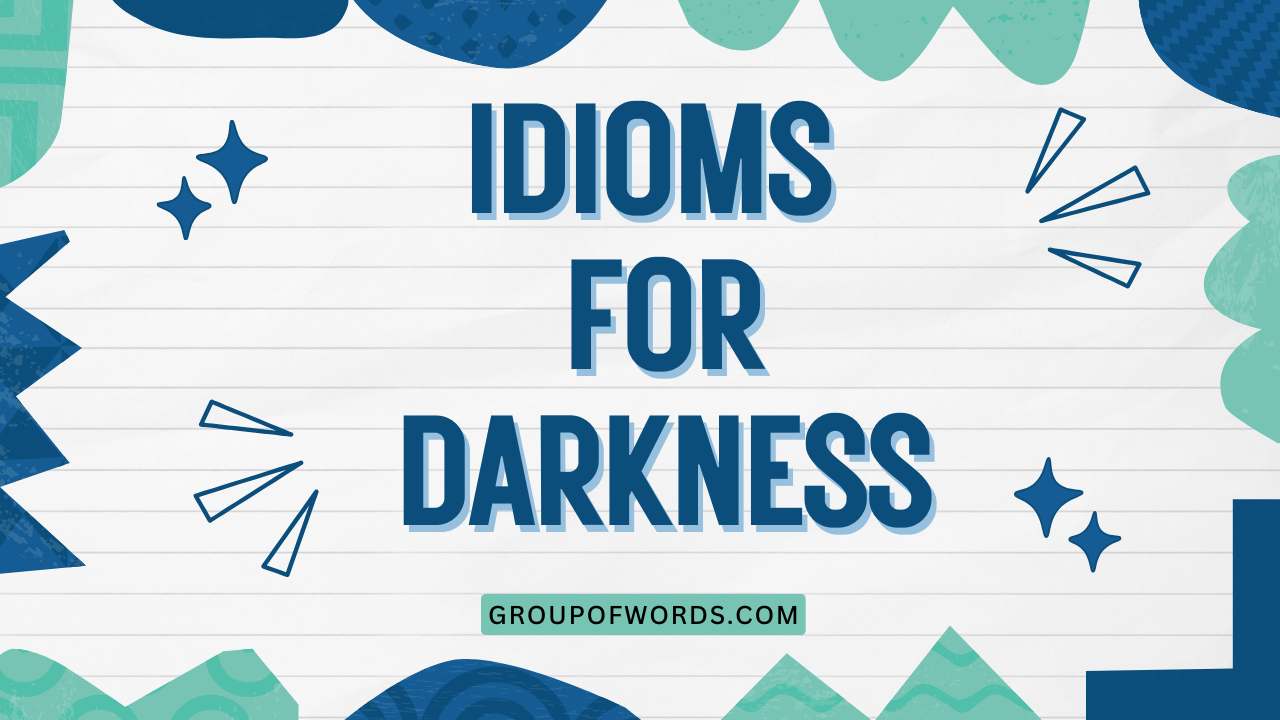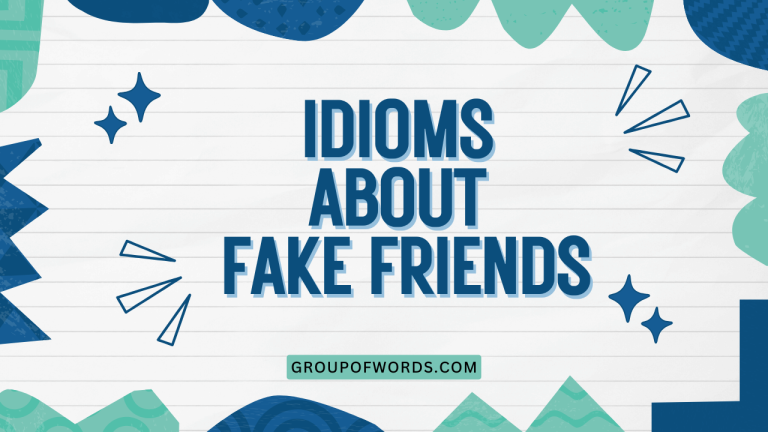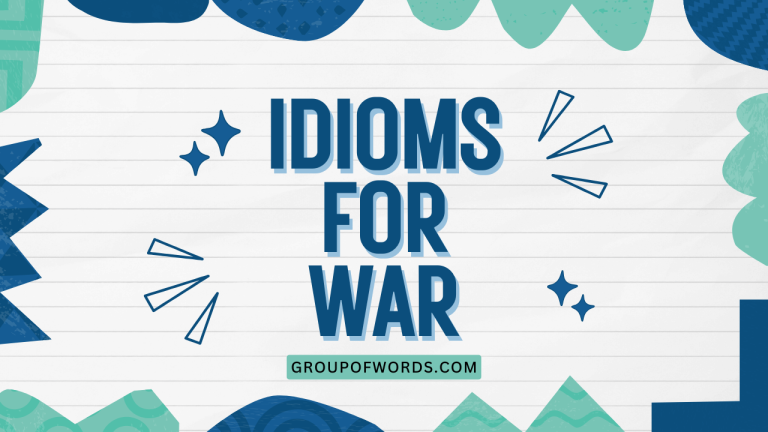Illuminating Language: Mastering Idioms for Darkness
Idioms enrich the English language, adding color and depth to our conversations and writing. Understanding idioms related to darkness is particularly useful, as they often convey complex emotions and situations in a concise and evocative manner.
This article explores a wide range of idioms associated with darkness, providing definitions, examples, and practical exercises to help you master their usage. Whether you are an English language learner or a native speaker looking to enhance your vocabulary, this guide will shed light on the fascinating world of idioms for darkness.
Table of Contents
- Introduction
- Defining Idioms for Darkness
- Structural Breakdown of Idioms
- Types and Categories of Darkness Idioms
- Examples of Idioms for Darkness
- Usage Rules for Idioms
- Common Mistakes with Darkness Idioms
- Practice Exercises
- Advanced Topics in Idiom Usage
- Frequently Asked Questions
- Conclusion
Defining Idioms for Darkness
An idiom is a phrase or expression whose meaning cannot be understood from the literal meanings of the individual words. Instead, it has a figurative meaning that is culturally specific.
Idioms related to darkness often use the imagery of night, shadows, and lack of light to convey abstract concepts such as ignorance, secrecy, despair, danger, or insignificance. These idioms can add richness and nuance to your communication, but it’s essential to understand their intended meaning to use them correctly.
The function of idioms is to provide a more colorful and engaging way to express ideas than literal language. They often reflect cultural values and historical contexts, making them an integral part of a language’s identity.
In the context of darkness, idioms can be particularly powerful in evoking emotions and creating vivid imagery.
Idioms can be classified based on their subject matter and the emotions they evoke. For example, some idioms of darkness might relate to fear and uncertainty, while others denote a lack of understanding or knowledge.
Recognizing these categories can help you better grasp the subtle differences in meaning and usage.
Structural Breakdown of Idioms
Idioms often defy standard grammatical rules because their meaning is not derived from their individual components. Instead, they function as single units of meaning.
The structure of an idiom can vary widely – it may be a simple phrase, a clause, or even a full sentence. However, the key characteristic is that the words must be used together to convey the intended meaning.
Separating or altering the words typically destroys the idiom’s impact and meaning.
The structure of an idiom can be analyzed in terms of its components, but it’s important to remember that these components don’t contribute independently to the overall meaning. For example, in the idiom “a shot in the dark,” each word has its own literal meaning, but when combined, they represent a wild guess or a risky attempt.
The phrase functions as a unit, and its meaning is not simply the sum of its parts.
Understanding the structure of idioms also involves recognizing their flexibility. While some idioms are fixed and cannot be altered, others allow for slight variations without losing their meaning.
For instance, “to keep someone in the dark” can also be expressed as “to leave someone in the dark.” Identifying these variations can improve your ability to recognize and use idioms effectively.
Types and Categories of Darkness Idioms
Idioms for darkness can be grouped into several categories based on the themes they represent. These categories help in understanding the nuances and contexts in which these idioms are used.
Let’s explore some common categories:
Idioms Related to Ignorance and Confusion
These idioms describe situations where someone lacks knowledge or understanding, often implying a state of uncertainty or bewilderment. They use the metaphor of darkness to represent the absence of clear information or insight.
Idioms Related to Secrecy and Concealment
These idioms refer to the act of hiding information or keeping something secret. The darkness symbolizes the hidden nature of the information, implying that it is intentionally kept from others.
Idioms Related to Gloom and Despair
These idioms express feelings of sadness, hopelessness, or negativity. The darkness represents the emotional state of the person, reflecting a lack of joy or optimism.
Idioms Related to Danger and Threat
These idioms describe situations where there is potential harm or risk. The darkness symbolizes the unknown and unpredictable nature of the danger, suggesting that it is lurking and difficult to detect.
Idioms Related to Obscurity and Insignificance
These idioms refer to things that are not well-known or important. The darkness represents the lack of visibility or prominence, suggesting that the subject is hidden from view or insignificant.
Examples of Idioms for Darkness
To fully grasp the meaning and usage of idioms for darkness, it’s essential to examine them in context. The following tables provide examples of idioms categorized by theme, along with their meanings and example sentences.
Examples: Ignorance and Confusion
This table illustrates idioms that convey a lack of knowledge or understanding, often implying confusion or uncertainty. Each example provides the idiom, its meaning, and a sentence demonstrating its use.
| Idiom | Meaning | Example Sentence |
|---|---|---|
| In the dark | Unaware of something | They kept me in the dark about their plans until the last minute. |
| A shot in the dark | A wild guess | Applying for that job was a shot in the dark, but I got it! |
| Dark horse | A little-known person who emerges to prominence | He was a dark horse in the election, but he won unexpectedly. |
| Clear as mud | Not clear at all; confusing | His explanation was clear as mud; I still don’t understand the process. |
| Blind leading the blind | People who know nothing guiding others who know nothing | It’s like the blind leading the blind when inexperienced managers train new recruits. |
| Clouded judgment | Impaired decision-making ability | His emotions clouded his judgment, and he made a poor decision. |
| Fog of war | Uncertainty in battle | The fog of war made it difficult to assess the true situation. |
| Lost in the sauce | Confused or overwhelmed | He got lost in the sauce trying to manage too many tasks at once. |
| Whistle in the dark | Trying to be brave in a scary situation | He was just whistling in the dark when he claimed to be unafraid of the challenge. |
| Groping in the dark | Searching uncertainly | Without data, we’re just groping in the dark trying to solve the problem. |
| A stab in the dark | A random guess | I didn’t know the answer so I took a stab in the dark. |
| In a haze | Confused or unclear | She was in a haze after the accident and couldn’t remember what happened. |
| Muddy the waters | To make a situation more confusing | His comments only muddied the waters and made things more difficult. |
| Obscure the issue | To make an issue less clear | The politician tried to obscure the issue with complicated jargon. |
| Becloud the mind | To confuse or make unclear | Stress can becloud the mind and make it hard to focus. |
| Darken the doorstep | To visit or enter a place (often unwelcome) | He vowed never to darken her doorstep again after their argument. |
| Under a cloud | Under suspicion or disgrace | The company was under a cloud after the scandal was revealed. |
| Blind spot | An area where one lacks understanding | He has a blind spot when it comes to financial matters. |
| In a quandary | In a state of perplexity or doubt | She was in a quandary about which job offer to accept. |
| At sea | Confused or uncertain | I’m completely at sea with this new software. |
| A mystery wrapped in an enigma | Something completely baffling | The situation was a mystery wrapped in an enigma. |
| In the wilderness | Lost or uncertain | The project was in the wilderness for several years before being revived. |
| Left field | Unexpected or unconventional | His suggestion came completely out of left field. |
Examples: Secrecy and Concealment
This table showcases idioms that relate to keeping secrets or concealing information, using the imagery of darkness to symbolize hidden truths. Understanding these idioms will help you recognize and use them effectively in discussions about confidentiality and discretion.
| Idiom | Meaning | Example Sentence |
|---|---|---|
| Keep something in the dark | Keep something secret | They decided to keep the project in the dark until it was ready to launch. |
| Sweep under the rug | Hide or ignore a problem | The company tried to sweep the scandal under the rug, but it was eventually exposed. |
| Behind closed doors | In private | The negotiations took place behind closed doors. |
| Under wraps | Secret or confidential | The details of the deal are being kept under wraps. |
| Cloak and dagger | Involving secrecy and espionage | The movie was full of cloak and dagger activities. |
| Black ops | Covert or secret military operations | The mission was a series of black ops conducted in enemy territory. |
| Under the table | Secretly or illegally | He was paid under the table to avoid taxes. |
| Cover up | Conceal a mistake or wrongdoing | They tried to cover up the accident, but the truth came out. |
| Keep a lid on | Suppress or conceal information | The government tried to keep a lid on the news about the outbreak. |
| In camera | In private; not in public | The judge decided to hear the testimony in camera. |
| Mum’s the word | Keep it a secret | “Mum’s the word,” she said, winking. |
| Off the record | Not for publication | “This is off the record,” he said before revealing the details. |
| Pull the wool over someone’s eyes | Deceive someone | He tried to pull the wool over her eyes, but she saw through his lies. |
| Secret squirrel | Someone who likes to keep things secret | He’s such a secret squirrel; he never tells anyone anything. |
| Stone cold secret | A very well-kept secret | The location of the treasure is a stone cold secret. |
| Keep close to your chest | To keep something private | She kept her cards close to her chest during the negotiations. |
| Under a veil | Hidden or concealed | The truth was hidden under a veil of secrecy. |
| Out of the loop | Not informed about something | I was out of the loop and didn’t know about the meeting. |
| Behind the curtain | Secret or hidden from public view | The real power lies behind the curtain. |
| Ghosted | To disappear suddenly without explanation | He ghosted her after their first date. |
| Black market | An illegal market | They sold stolen goods on the black market. |
| Shadowy figure | A mysterious or suspicious person | A shadowy figure was seen lurking near the building. |
| In the shadows | Hidden or secretive | He preferred to work in the shadows, away from the public eye. |
Examples: Gloom and Despair
This table highlights idioms that express feelings of sadness, despair, or negativity. The use of darkness in these idioms evokes a sense of hopelessness and emotional distress.
Understanding and using these idioms can add depth and emotion to your expressions of sorrow or disappointment.
| Idiom | Meaning | Example Sentence |
|---|---|---|
| Dark days | Times of trouble or unhappiness | The country went through some dark days during the recession. |
| Black mood | A state of unhappiness or anger | He’s been in a black mood ever since he lost his job. |
| Dark cloud | Something that spoils enjoyment | The scandal cast a dark cloud over the company’s reputation. |
| Down in the dumps | Sad or depressed | She’s been down in the dumps since her pet died. |
| Blue devils | Feelings of depression | He had a bad case of the blue devils after the breakup. |
| Black dog | A term for depression | He’s been battling the black dog for many years. |
| In the doldrums | In a state of inactivity or stagnation | The project was in the doldrums for months. |
| Shadow of a doubt | A slight uncertainty | There’s not a shadow of a doubt in my mind that he’s guilty. |
| See a black future | To be pessimistic about the future | He saw a black future after his business failed. |
| A pall of gloom | A pervasive sense of sadness | A pall of gloom hung over the town after the tragedy. |
| At the end of one’s rope | Having no more patience or energy | She was at the end of her rope after dealing with the difficult situation. |
| Cry one’s heart out | To cry intensely | She cried her heart out after hearing the news. |
| Down in the mouth | Looking depressed | He looked down in the mouth after his team lost the game. |
| Hangdog look | A dejected or guilty expression | He had a hangdog look on his face after being caught. |
| In a funk | In a state of low spirits | She’s been in a funk since her vacation ended. |
| On a downer | Feeling depressed | He was on a downer after the disappointing news. |
| Singing the blues | Feeling sad or depressed | She’s been singing the blues since her boyfriend left. |
| Wear a long face | To look sad or unhappy | He wore a long face after failing the exam. |
| Black as pitch | Extremely dark | The night was black as pitch, making it hard to see. |
| Darkest hour | The worst possible time | Just before dawn is the darkest hour. |
| On the dark side | Negative or pessimistic | He always looks on the dark side of things. |
| Black sheep | A disgrace to the family or group | He was the black sheep of the family. |
Examples: Danger and Threat
This table features idioms that convey a sense of danger, threat, or potential harm. The use of darkness highlights the hidden and unpredictable nature of these risks.
Understanding these idioms can help you communicate more effectively about hazardous situations and potential threats.
| Idiom | Meaning | Example Sentence |
|---|---|---|
| Dark side | The evil or dangerous aspect of something | Every technology has a dark side that must be considered. |
| Storm clouds gathering | Trouble is brewing | Storm clouds are gathering over the company due to the financial crisis. |
| Into the jaws of death | Into a dangerous situation | The soldiers marched into the jaws of death with courage. |
| Skating on thin ice | Taking a risk; being in a precarious situation | He’s skating on thin ice with his boss after missing several deadlines. |
| Walking a tightrope | Handling a difficult situation carefully | The diplomat is walking a tightrope to avoid escalating the conflict. |
| Dark arts | Evil or unethical practices | The politician was accused of using dark arts to win the election. |
| In harm’s way | In a dangerous place | The aid workers were putting themselves in harm’s way to help the victims. |
| Living on the edge | Taking risks; leading a dangerous life | He’s been living on the edge ever since he quit his job to travel the world. |
| Play with fire | Take a dangerous risk | You’re playing with fire by investing in such a volatile market. |
| Under the gun | Under pressure or threat | The team was under the gun to finish the project on time. |
| Blackmail | To extort someone | He was a victim of blackmail. |
| Black mark | A stain on one’s reputation | The scandal left a black mark on his career. |
| Darken the door/day | To bring trouble or misfortune | He vowed never to darken their door again. |
| On the warpath | Angry and ready to confront | She was on the warpath after discovering the mistake. |
| Stare down the barrel of a gun | To face imminent danger | He stared down the barrel of a gun during the robbery. |
| Tread carefully | To proceed with caution | You need to tread carefully when discussing this issue. |
| Walking on eggshells | Being very careful not to upset someone | Everyone is walking on eggshells around the boss today. |
| A cloud on the horizon | A future problem or threat | There’s a cloud on the horizon regarding the company’s finances. |
| Hang over one’s head | To be a constant threat or worry | The debt was hanging over his head. |
| Sitting duck | An easy target | Without security, the building is a sitting duck. |
| A wolf in sheep’s clothing | Someone who appears harmless but is dangerous | He seemed nice, but he turned out to be a wolf in sheep’s clothing. |
| The writing is on the wall | An impending disaster is clear | The writing is on the wall; the company is going to fail. |
Examples: Obscurity and Insignificance
This table includes idioms that describe things that are not well-known, important, or easily understood. Darkness illustrates the lack of visibility or prominence, suggesting these things are hidden from view or insignificant.
Learning these idioms can help you describe situations where something lacks clarity or recognition.
| Idiom | Meaning | Example Sentence |
|---|---|---|
| In the shade | In a position of less power or importance | He’s been in the shade since the new manager took over. |
| Fade into the background | To become less noticeable | She tried to fade into the background during the meeting. |
| Lost in the shuffle | Forgotten or overlooked | His application got lost in the shuffle. |
| Neither here nor there | Irrelevant or unimportant | That point is neither here nor there. |
| Small potatoes | Unimportant or trivial | These issues are small potatoes compared to the real problems. |
| Under the radar | Without being noticed | He tried to stay under the radar to avoid attention. |
| A drop in the bucket | A very small amount compared to what’s needed | The donation was just a drop in the bucket compared to the total cost. |
| A flash in the pan | Something that shows initial promise but fails to deliver | His success was just a flash in the pan. |
| Back burner | Given low priority | The project was put on the back burner due to budget cuts. |
| Bottom of the pile | The lowest position in a ranking | He was at the bottom of the pile in terms of seniority. |
| Dark matter | Unimportant or insignificant | Compared to the main issues, that’s just dark matter. |
| Dim view | A negative opinion | The boss took a dim view of his performance. |
| Dust to dust | Returning to insignificance | We all return to dust to dust. |
| In the boondocks | A remote and insignificant location | He grew up in the boondocks. |
| A needle in a haystack | Something almost impossible to find | Finding the document was like looking for a needle in a haystack. |
| Not worth a dime | Worthless | His opinion isn’t worth a dime. |
| One-horse town | A small, insignificant town | He grew up in a one-horse town. |
| Pass into oblivion | To be forgotten completely | The ancient civilization has passed into oblivion. |
| Under a bushel | Hidden or suppressed | Don’t hide your talents under a bushel. |
Usage Rules for Idioms
Using idioms correctly requires understanding their specific meanings and the contexts in which they are appropriate. Here are some key rules to keep in mind:
- Know the meaning: Always be sure you understand the idiom’s figurative meaning, not just the literal meanings of the words. Using an idiom incorrectly can lead to confusion or miscommunication.
- Consider the context: Idioms are often informal and may not be suitable for formal writing or speech. Consider your audience and the purpose of your communication when deciding whether to use an idiom.
- Use them sparingly: Overusing idioms can make your language sound unnatural or cliché. Use them judiciously to add color and emphasis to your writing or speech.
- Pay attention to grammar: While idioms themselves may not follow standard grammatical rules, they must be integrated grammatically into the sentence. Ensure that the idiom fits the sentence structure and agrees with the subject and verb.
- Be aware of cultural differences: Idioms are often culturally specific, and what is common in one culture may be unfamiliar or confusing in another. Be mindful of your audience’s cultural background when using idioms.
Some idioms have variations that are acceptable, while others are fixed and cannot be altered without losing their meaning. For example, “keep someone in the dark” is acceptable, while changing it to “hold someone in the dark” would be incorrect.
Pay attention to these nuances and learn the correct forms of the idioms you use.
Common Mistakes with Darkness Idioms
One of the most common mistakes is taking idioms literally. For instance, someone might misunderstand “a shot in the dark” to mean an actual gunshot at night, rather than a wild guess.
Understanding the figurative meaning is crucial.
Another frequent error is using idioms in inappropriate contexts. For example, using “down in the dumps” in a formal business report would be out of place.
Knowing when and where to use idioms is essential for effective communication.
Here are some examples of correct and incorrect usage:
| Incorrect | Correct | Explanation |
|---|---|---|
| “He kept me in a dark.” | “He kept me in the dark.” | The correct idiom is “in the dark,” not “in a dark.” |
| “She was down in the garbage.” | “She was down in the dumps.” | The correct idiom is “down in the dumps,” meaning sad. |
| “It was a shoot in the dark.” | “It was a shot in the dark.” | The correct idiom is “shot in the dark,” meaning a wild guess. |
| “They swept the problem under the blanket.” | “They swept the problem under the rug.” | The correct idiom is “sweep under the rug,” meaning to hide a problem. |
Practice Exercises
Test your understanding of idioms for darkness with these exercises. Each exercise focuses on different aspects of idiom usage, from identifying meanings to using idioms in context.
Exercise 1: Fill in the Blanks
Complete the following sentences with the appropriate idiom from the list. Choose from: in the dark, a shot in the dark, dark horse, clear as mud, sweep under the rug.
- They decided to __________ about the financial issues.
- His explanation was __________; I still don’t understand it.
- He was a __________ in the competition, but he ended up winning.
- We were kept __________ about the changes until the last minute.
- Applying for that job was __________, but I got it!
Answers:
- sweep under the rug
- clear as mud
- dark horse
- in the dark
- a shot in the dark
Exercise 2: Matching Idioms to Meanings
Match the idiom to its meaning.
| Idiom | Meaning |
|---|---|
| 1. Black mood | A. Secret or confidential |
| 2. Under wraps | B. To take a dangerous risk |
| 3. Play with fire | C. A state of unhappiness or anger |
| 4. Lost in the shuffle | D. Unimportant or trivial |
| 5. Small potatoes | E. Forgotten or overlooked |
Answers:
- 1 – C
- 2 – A
- 3 – B
- 4 – E
- 5 – D
Exercise 3: Sentence Completion
Choose the best idiom to complete the sentence.
- After the scandal, the company was __________.
- a. in the dark
- b. under a cloud
- c. down in the dumps
- He’s been __________ ever since he lost his job.
- a. seeing a black future
- b. in harm’s way
- c. under wraps
- The details of the project are being kept __________.
- a. under wraps
- b. in the shade
- c. on the warpath
- Without any evidence, we’re just __________.
- a. groping in the dark
- b. playing with fire
- c. sweeping under the rug
- He’s always looking __________.
- a. in the shade
- b. on the dark side
- c. on the back burner
Answers:
- b. under a cloud
- a. seeing a black future
- a. under wraps
- a. groping in the dark
- b. on the dark side
Advanced Topics in Idiom Usage
Beyond basic understanding and usage, there are advanced techniques to master idioms. One such technique is recognizing and using idioms in creative ways to add depth and originality to your writing or speech.
This might involve subtly altering an idiom to fit a specific context or combining idioms to create a unique effect.
Another advanced topic is understanding the historical and cultural origins of idioms. Many idioms have fascinating stories behind them, and knowing these stories can enrich your understanding and appreciation of the language.
For example, the idiom “skeleton in the closet” has roots in the practice of keeping skeletons for medical study, which were often hidden due to social stigma.
Additionally, mastering idioms involves recognizing their subtle nuances and variations. Some idioms have multiple meanings or can be used in different ways depending on the context.
Pay attention to these subtleties and learn to use idioms with precision and accuracy.
Frequently Asked Questions
What is the difference between an idiom and a metaphor?
An idiom is a phrase whose meaning is different from the literal meanings of its individual words, while a metaphor is a figure of speech that directly compares two unrelated things. Idioms are often fixed expressions, whereas metaphors can be more flexible and creative.
How can I improve my understanding of idioms?
Read widely, pay attention to how native speakers use idioms, and practice using them in your own writing and speech. Use resources like dictionaries and idiom guides to look up unfamiliar expressions and learn their meanings.
Are idioms universal, or do they vary by culture?
Idioms are often culturally specific and can vary widely from one culture to another. What is a common idiom in one language may be completely unfamiliar or have a different meaning in another.
Is it okay to use idioms in formal writing?
It depends on the context and audience. In general, idioms are more appropriate for informal writing and speech.
In formal contexts, it’s best to use more direct and literal language unless you are certain that your audience will understand and appreciate the idiom.
How can I avoid misusing idioms?
Always double-check the meaning and usage of an idiom before using it, especially if you are not a native speaker. Pay attention to the context and make sure the idiom fits grammatically and stylistically into your sentence.
Conclusion
Mastering idioms for darkness can significantly enhance your communication skills, allowing you to express complex ideas and emotions with greater nuance and impact. By understanding the meanings, usage rules, and common mistakes associated with these idioms, you can use them effectively in both writing and speech.
Continue to practice and expand your knowledge, and you’ll find that idioms become a valuable tool in your linguistic arsenal. Embrace the richness and color that idioms bring to the English language, and you’ll be well on your way to becoming a more articulate and expressive communicator.






